Boyle J.A. The Cambridge History of Iran, Volume 5: The Saljuq and Mongol Periods
Подождите немного. Документ загружается.

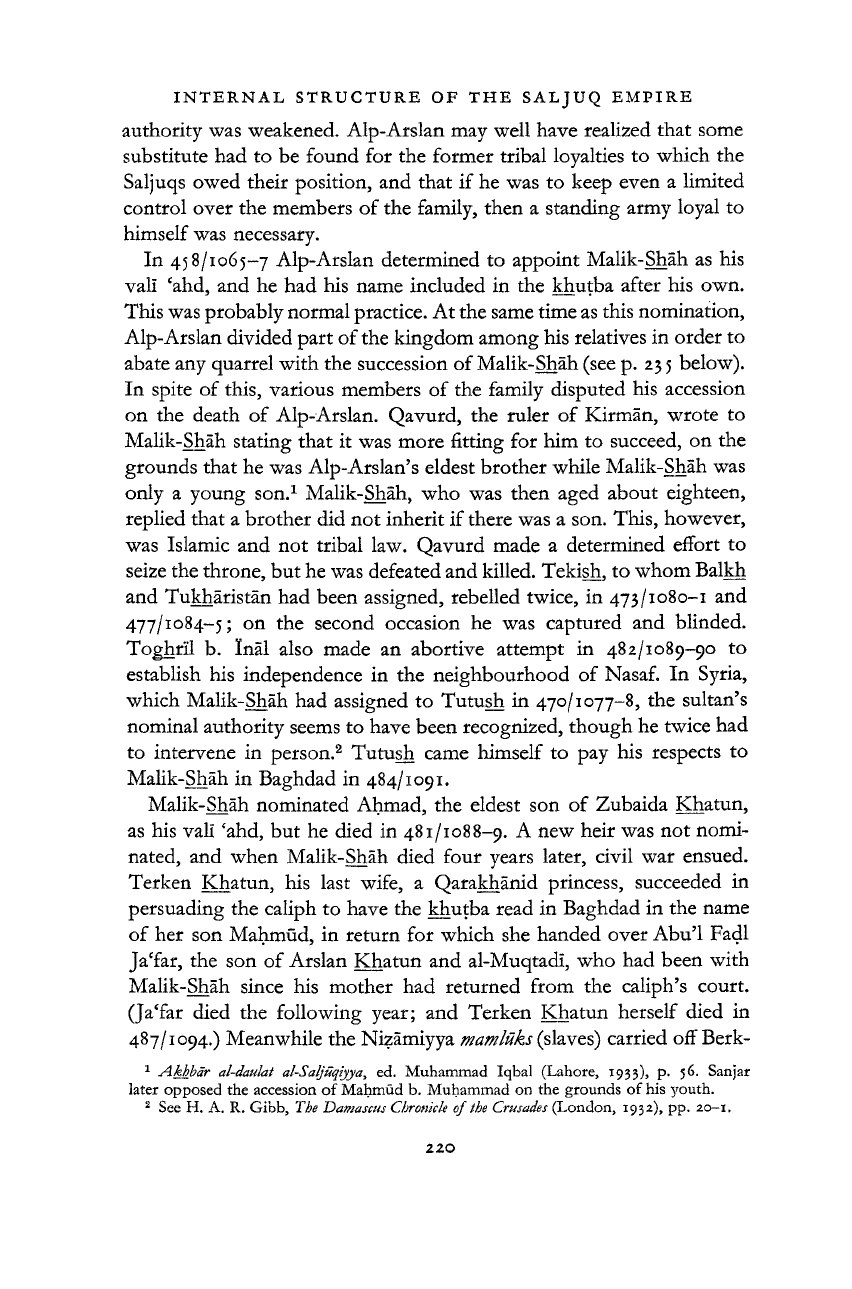
INTERNAL
STRUCTURE
OF THE SALJUQ EMPIRE
220
authority
was weakened. Alp-Arslan may well have realized that some
substitute had to be found for the former
tribal
loyalties to which the
Saljuqs
owed their position, and that if he was to keep even a limited
control
over the members of the family, then a standing army loyal to
himself was necessary.
In
458/1065-7
Alp-Arslan determined to appoint Malik-Shah as his
vali
'ahd, and he had his name included in the khutba
after
his own.
This was probably normal practice. At the same time as this nomination,
Alp-Arslan
divided
part
of the kingdom among his relatives in order to
abate
any
quarrel
with the
succession
of Malik-Shah (see p. 23 5 below).
In spite of this, various members of the family disputed his accession
on the death of
Alp-Arslan.
Qavurd, the
ruler
of
Kirman,
wrote to
Malik-Shah
stating that it was more fitting for him to succeed, on the
grounds that he was Alp-Arslan's eldest brother while Malik-Shah was
only a young son.
1
Malik-Shah, who was then aged about eighteen,
replied
that a brother did not inherit if there was a son. This, however,
was Islamic and not
tribal
law. Qavurd made a determined eifort to
seize
the throne, but he was defeated and killed. Tekish, to whom Balkh
and Tukharistan had been assigned, rebelled twice, in
473/1080-1
and
477/1084-5;
on the second occasion he was captured and blinded.
Toghril b. Inal also made an abortive attempt in
482/1089-90
to
establish his independence in the neighbourhood of
Nasaf.
In
Syria,
which Malik-Shah had assigned to Tutush in
470/1077-8,
the sultan's
nominal authority
seems
to have been recognized, though he twice had
to intervene in person.
2
Tutush came himself to pay his respects to
Malik-Shah
in Baghdad in
484/1091.
Malik-Shah
nominated Ahmad, the eldest son of Zubaida Khatun,
as his vali 'ahd, but he died in
481/1088-9.
A new heir was not nomi-
nated, and when Malik-Shah died four years
later,
civil war ensued.
Terken Khatun, his last wife, a Qarakhanid princess, succeeded in
persuading the caliph to have the khutba read in Baghdad in the name
of her son Mahmud, in
return
for which she handed over Abu'l Fadl
Ja'far,
the son of Arslan Khatun and al-Muqtadl, who had been with
Malik-Shah
since his mother had returned from the caliph's court.
(Ja'far
died the following
year;
and Terken Khatun herself died in
487/1094.)
Meanwhile the Nizamiyya
mamluks
(slaves) carried offBerk-
1
Akhbdr al-daulat
al-Saljuqiyya,
ed. Muhammad Iqbal (Lahore, 1933), p. 56. Sanjar
later
opposed
the
accession
of Mahmud b. Muhammad on the
grounds
of his youth.
2
See H. A. R. Gibb, The
Damascus
Chronicle
of
the
Crusades
(London, 1932), pp. 20-1.
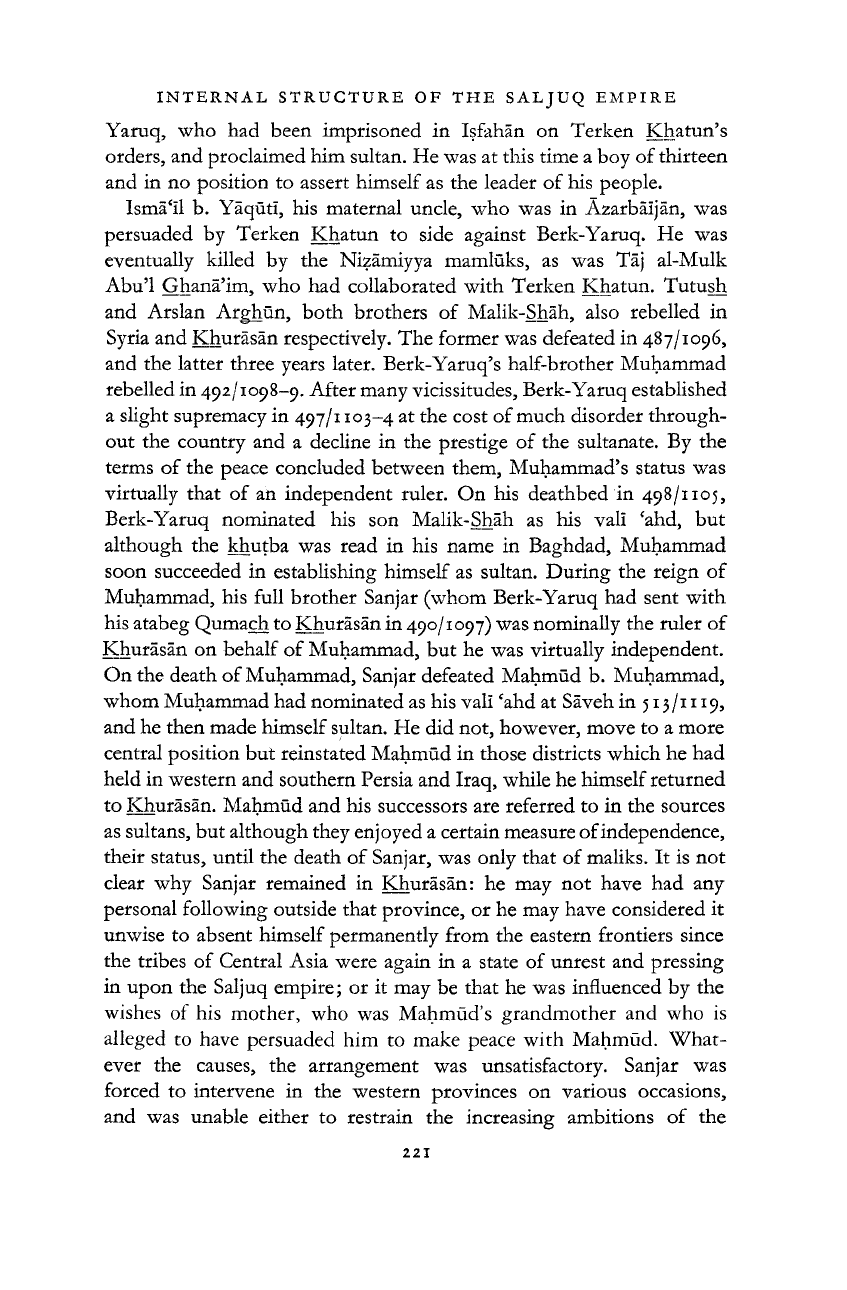
INTERNAL
STRUCTURE
OF THE
SALJUQ
EMPIRE
221
Yaruq,
who had
been
imprisoned in Isfahan on Terken Khatun's
orders,
and proclaimed him sultan. He was at this time a boy of thirteen
and in no position to assert himself as the leader of his people.
Isma'il b. Yaquti, his maternal uncle, who was in Azarbaijan, was
persuaded by Terken
Khatun to
side
against Berk-Yaruq. He was
eventually
killed by the Nizamiyya mamluks, as was Taj al-Mulk
Abu'l
Ghana'im, who had collaborated with Terken Khatun. Tutush
and Arslan Arghun, both brothers of Malik-
Shah, also rebelled in
Syria
and Khurasan respectively. The former was defeated in
487/1096,
and the latter three years
later.
Berk-Yaruq's half-brother Muhammad
rebelled in
492/1098-9.
After
many vicissitudes, Berk-Yaruq established
a
slight supremacy in
497/1103-4
at the
cost
of much disorder through-
out the country and a decline in the prestige of the sultanate. By the
terms
of the peace concluded between them, Muhammad's status was
virtually
that of ah independent
ruler.
On his deathbed in
498/1105,
Berk-Yaruq
nominated his son Malik-Shah as his vali
c
ahd, but
although the khutba was read in his name in Baghdad, Muhammad
soon
succeeded
in establishing himself as sultan. During the reign of
Muhammad, his full brother
Sanjar
(whom Berk-Yaruq had sent with
his atabeg Qumach to
Khurasan in
490/1097)
was nominally the
ruler
of
Khurasan
on behalf of Muhammad, but he was
virtually
independent.
On the death of Muhammad,
Sanjar
defeated Mahmud b. Muhammad,
whom Muhammad had nominated as his vali
c
ahd at Saveh
^1513/1119,
and he then made himself sultan. He did not, however, move to a more
central
position but reinstated Mahmud in those districts which he had
held in western and southern Persia and
Iraq,
while he himself returned
to Khurasan. Mahmud and his successors are
referred
to in the sources
as sultans, but although they enjoyed a certain measure of independence,
their
status, until the death of
Sanjar,
was only that of maliks. It is not
clear
why
Sanjar
remained in Khurasan: he may not have had any
personal following outside that province, or he may have considered it
unwise to absent himself permanently from the eastern frontiers
since
the tribes of Central Asia were again in a state of unrest and pressing
in upon the Saljuq empire; or it may be that he was influenced by the
wishes of his mother, who was Mahmud's grandmother and who is
alleged to have persuaded him to make peace with Mahmud.
What-
ever
the causes, the arrangement was unsatisfactory.
Sanjar
was
forced to intervene in the western provinces on various occasions,
and was unable either to restrain the increasing ambitions of the
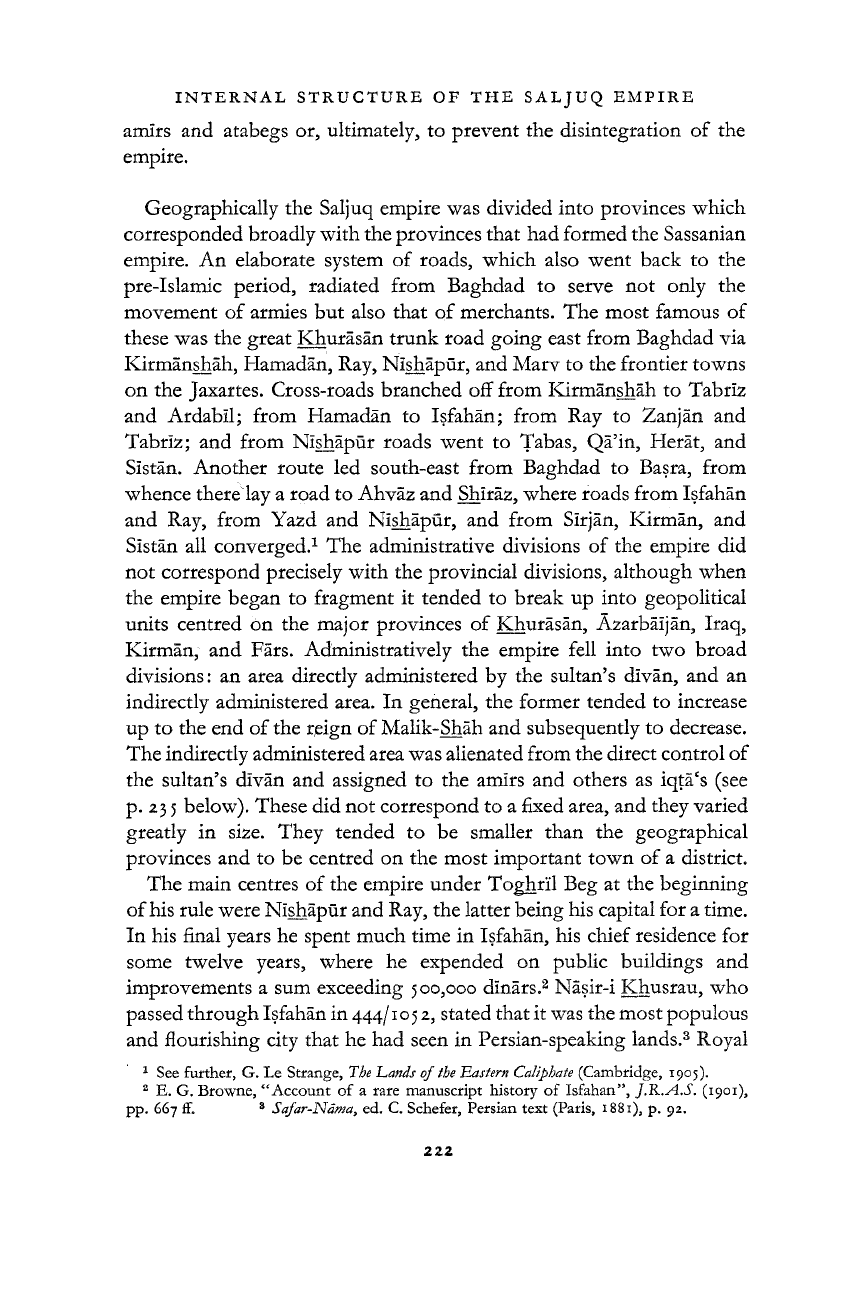
INTERNAL
STRUCTURE OF THE SALJUQ EMPIRE
222
amirs
and atabegs or, ultimately, to prevent the disintegration of the
empire.
Geographically the Saljuq empire was divided into provinces which
corresponded broadly with the provinces that had formed the Sassanian
empire. An elaborate system of roads, which also went back to the
pre-Islamic period, radiated from Baghdad to serve not only the
movement of armies but also that of merchants. The most famous of
these was the great Khurasan trunk road
going
east from Baghdad via
Kirmanshah,
Hamadan, Ray, Nishapur, and
Marv
to the frontier towns
on the
Jaxartes.
Cross-roads branched off from Kirmanshah to Tabriz
and Ardabil; from Hamadan to Isfahan; from Ray to Zanjan and
Tabriz;
and from Nishapur roads went to Tabas, Qa'in, Herat, and
Sistan.
Another route led south-east from Baghdad to Basra, from
whence there lay a road to Ahvaz and Shiraz, where roads from Isfahan
and Ray, from Yazd and Nishapur, and from
Sirj
an, Kirman, and
Sistan all converged.
1
The administrative divisions of the empire did
not correspond precisely with the provincial divisions, although when
the empire began to fragment it tended to break up into geopolitical
units centred on the major provinces of Khurasan, Azarbaijan, Iraq,
Kirman,
and Fars. Administratively the empire fell into two broad
divisions: an area directly administered by the sultan's divan, and an
indirectly
administered area. In general, the former tended to increase
up to the end of the reign of Malik-Shah and subsequently to decrease.
The indirectly administered area was alienated from the direct control of
the sultan's divan and
assigned
to the amirs and others as iqta's (see
p.
235 below).
These
did not correspond to a fixed area, and they varied
greatly
in
size.
They tended to be smaller than the geographical
provinces and to be centred on the most important town of a district.
The main centres of the empire under Toghril Beg at the beginning
of his rule were Nishapur and Ray, the latter
being
his capital for a time.
In his final years he spent much time in Isfahan, his chief residence for
some
twelve years, where he expended on public buildings and
improvements a sum
exceeding
500,000
dinars.
2
Nasir-i Khusrau, who
passed through Isfahan in
444/1052,
stated that it was the most populous
and flourishing city that he had
seen
in Persian-speaking lands.
3
Royal
1
See
further,
G. Le Strange, The Lands of
the
Eastern
Caliphate
(Cambridge,
1905).
2
E. G.
Browne,
"Account of a
rare
manuscript
history
of
Isfahan",
J.R.A.S. (1901),
pp. 667 ff.
8
Safar-Ndma, ed. C.
Schefer,
Persian
text
(Paris,
1881), p. 92.
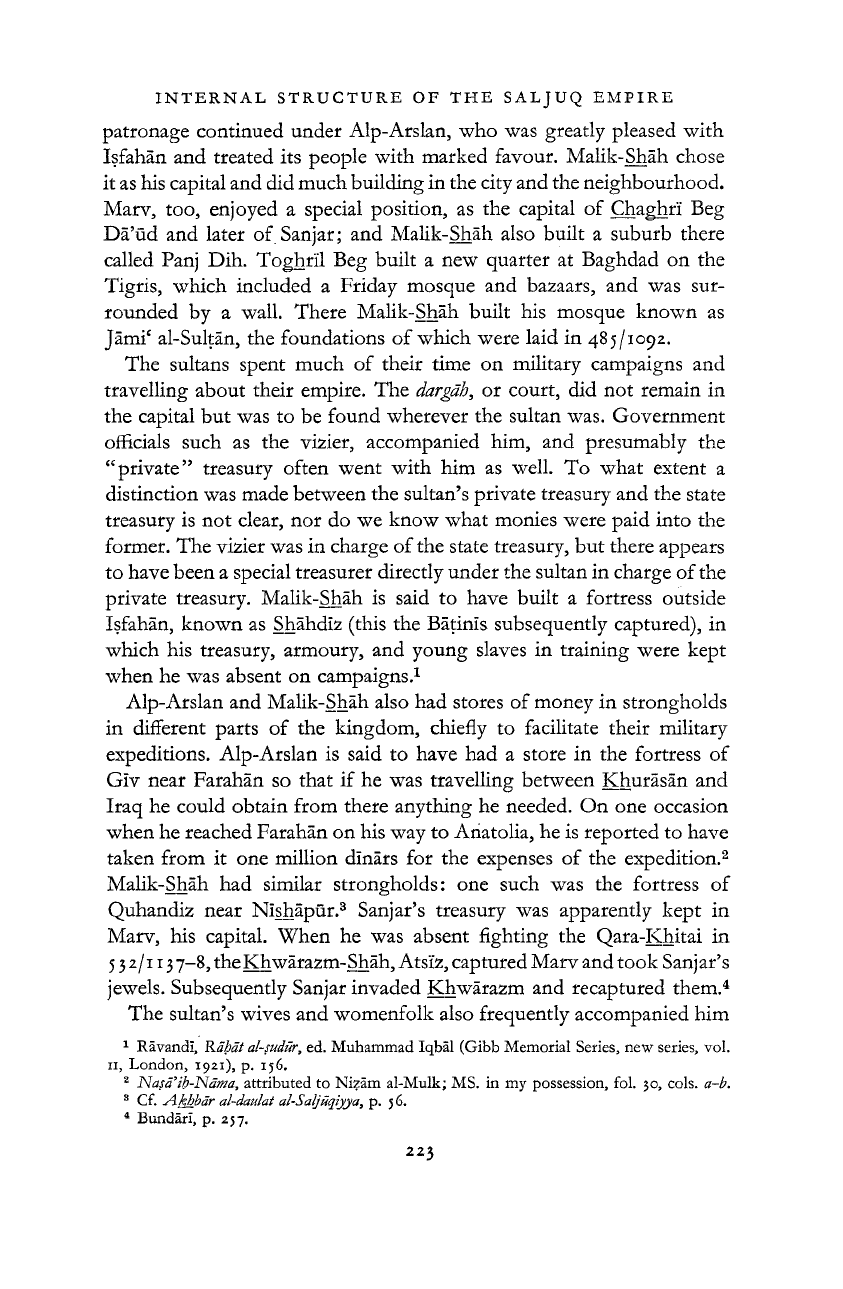
INTERNAL
STRUCTURE OF THE SALJUQ EMPIRE
223
patronage continued under Alp-Arslan, who was greatly pleased with
Isfahan and treated its people with marked favour. Malik-Shah
chose
it
as his capital and did much building in the city and the neighbourhood.
Marv,
too, enjoyed a special position, as the capital of Chaghri Beg
Da'ud and later of
Sanjar;
and Malik-Shah also built a suburb there
called Panj Dih. Toghril Beg built a new quarter at Baghdad on the
Tigris, which included a Friday mosque and bazaars, and was sur-
rounded by a wall. There Malik-Shah built his mosque known as
Jami
c
al-Sultan, the foundations of which were laid in
485/1092.
The sultans spent much of their time on military campaigns and
travelling
about their empire. The
dargdb,
or court, did not remain in
the capital but was to be found wherever the sultan was. Government
officials
such
as the vizier, accompanied him, and presumably the
"private"
treasury often went with him as well. To what extent a
distinction was made between the sultan's private treasury and the state
treasury
is not clear, nor do we know what monies were paid into the
former.
The vizier was in charge of the state treasury, but there appears
to have
been
a special treasurer directly under the sultan in charge of the
private
treasury. Malik-Shah is said to have built a fortress outside
Isfahan, known as Shahdiz (this the Batinis subsequently captured), in
which his treasury, armoury, and young slaves in training were kept
when he was absent on campaigns.
1
Alp-Arslan
and Malik-Shah also had stores of money in strongholds
in different parts of the kingdom, chiefly to facilitate their military
expeditions. Alp-Arslan is said to have had a store in the fortress of
Giv
near Farahan so that if he was travelling between Khurasan and
Iraq
he could obtain from there anything he needed. On one
occasion
when he reached Farahan on his way to Anatolia, he is reported to have
taken from it one million dinars for the
expenses
of the expedition.
2
Malik-Shah
had similar strongholds: one
such
was the fortress of
Quhandiz near Nishapur.
3
Sanjar's
treasury was apparently kept in
Marv,
his capital. When he was absent fighting the Qara-Khitai in
532/113
7-8,
the
Khwarazm-Shah,
Atsi'z,
captured
Marv
and took
Sanjar's
jewels.
Subsequently
Sanjar
invaded Khwarazm and recaptured them.
4
The sultan's wives and womenfolk also frequently accompanied him
1
Ravandi, Rabat
al-sudur,
ed. Muhammad Iqbal (Gibb Memorial
Series,
new
series,
vol.
11,
London, 1921), p. 156.
2
Nasd'ib-Ndma,
attributed
to Nizam al-Mulk; MS. in my
possession,
fol. 30,
cols.
a-b.
3
Cf. Akhbar
al-daulat
al-Saljuqiyya,
p.
5
6.
4
Bundari, p. 257.
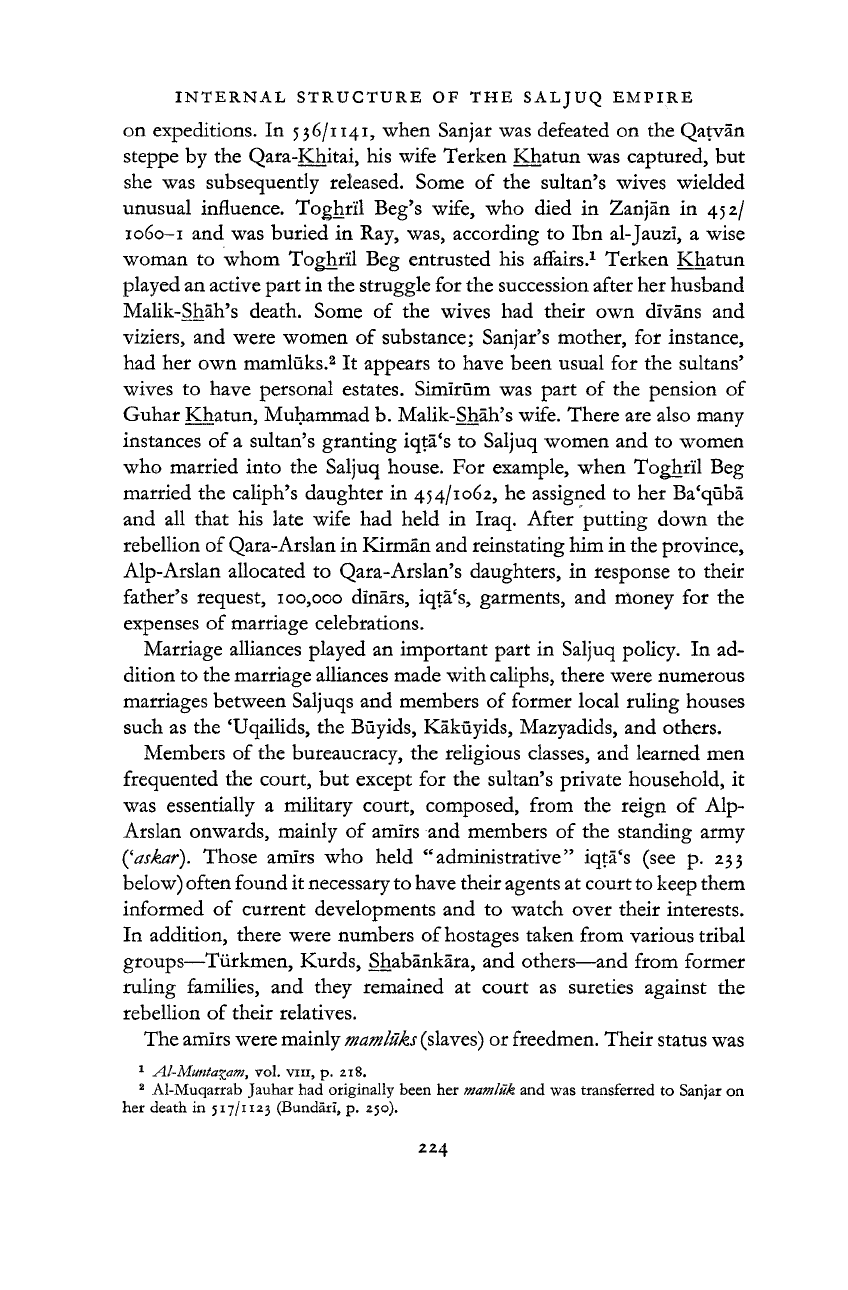
INTERNAL
STRUCTURE OF THE SALJUQ EMPIRE
224
on expeditions. In
536/1141,
when
Sanjar
was defeated on the Qatvan
steppe by the Qara-Khitai, his wife Terken Khatun was captured, but
she was subsequently released. Some of the sultan's wives wielded
unusual influence. Toghril
Beg's
wife, who died in Zanjan in 452/
1060-1
and was buried in Ray, was, according to Ibn al-Jauzi, a wise
woman to whom To
ghril Beg entrusted his
affairs.
1
Terken Khatun
played an active
part
in the struggle for the
succession
after her husband
Malik-Shah's
death. Some of the wives had their own divans and
viziers,
and were women of substance;
Sanjar's
mother, for instance,
had her own mamluks.
2
It appears to have
been
usual for the sultans'
wives to have personal estates. Simirum was
part
of the pension of
Guhar
Khatun, Muhammad b. Malik-Shah's wife. There are also many
instances of a sultan's granting iqta's to Saljuq women and to women
who married into the Saljuq house. For example, when Toghril Beg
married
the caliph's daughter in
454/1062,
he
assigned
to her Ba'quba
and all that his late wife had held in Iraq.
After
putting down the
rebellion of Qara-Arslan in Kirman and reinstating him in the province,
Alp-Arslan
allocated to Qara-Arslan's daughters, in response to their
father's
request,
100,000
dinars, iqta's, garments, and money for the
expenses
of marriage celebrations.
Marriage
alliances played an important
part
in Saljuq policy. In ad-
dition to the marriage alliances made with caliphs, there were numerous
marriages
between Saljuqs and members of former local ruling
houses
such
as the 'Uqailids, the Buyids, Kakuyids, Mazyadids, and others.
Members of the bureaucracy, the religious classes, and learned men
frequented the court, but except for the sultan's private household, it
was essentially a military court, composed, from the reign of Alp-
Arslan
onwards, mainly of amirs and members of the standing army
('askar).
Those
amirs who held "administrative" iqta's (see p.
233
below) often found it necessary to have their agents at court to keep them
informed of current developments and to watch over their interests.
In addition, there were numbers of hostages taken from various tribal
groups—Turkmen,
Kurds,
Shabankara, and others—and from former
ruling families, and they remained at court as sureties against the
rebellion of their relatives.
The amirs were mainly
mamluks
(slaves) or freedmen. Their status was
1
Al-Munta%am
y
vol. vni, p. 218.
2
Al-Muqarrab Jauhar had
originally
been
her mamluk and was
transferred
to Sanjar on
her
death
in 517/1123 (Bundari, p. 250).
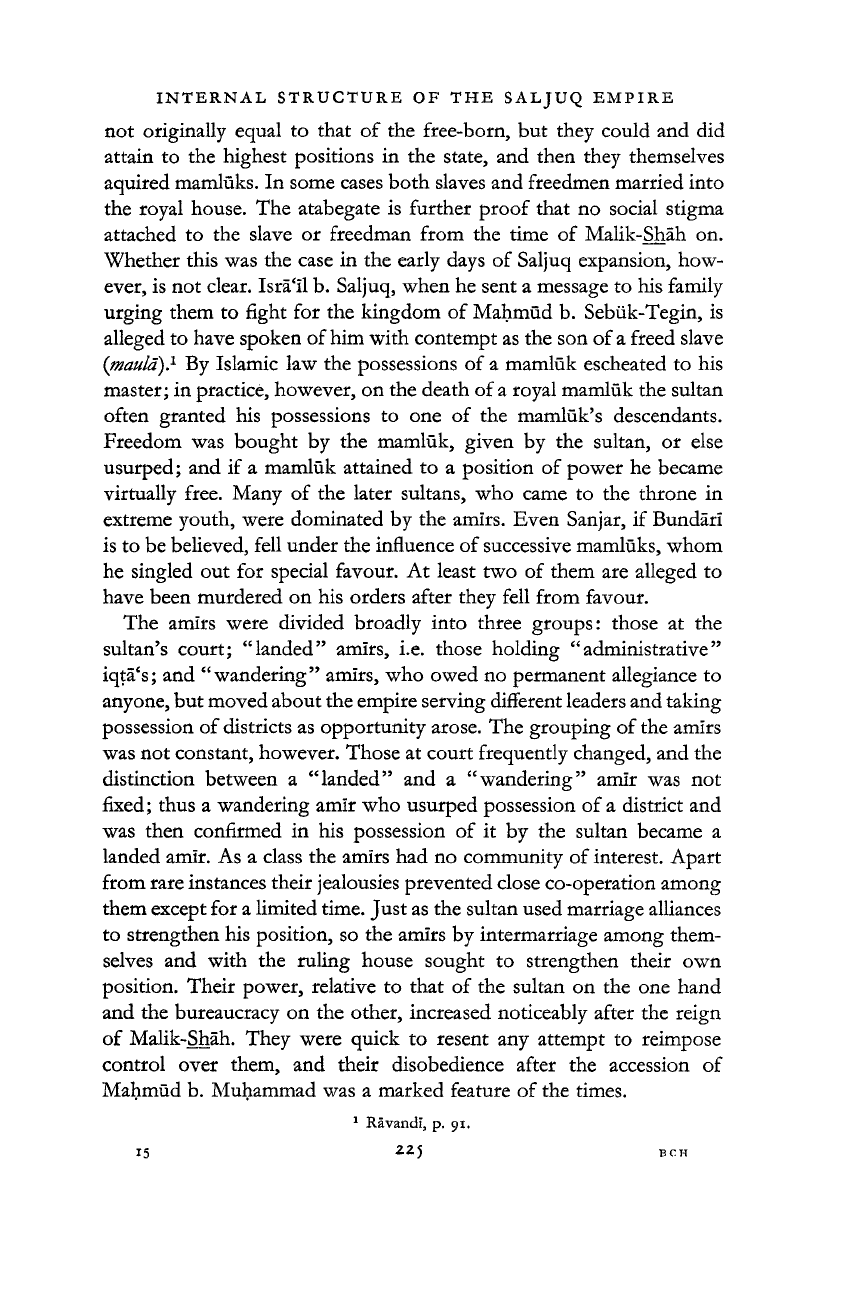
INTERNAL
STRUCTURE OF THE SALJUQ EMPIRE
not originally equal to that of the free-born, but they could and did
attain
to the highest positions in the state, and then they themselves
aquired
mamluks. In some cases both slaves and freedmen married into
the
royal
house. The atabegate is
further
proof that no social stigma
attached to the slave or freedman from the time of Malik-Shah on.
Whether
this was the case in the early days of Saljuq expansion, how-
ever,
is not clear. Isra'il b. Saljuq, when he sent a message to his family
urging them to fight for the kingdom of Mahmud b. Sebuk-Tegin, is
alleged to have spoken of him with contempt as the son of a freed slave
(mauld).
1
By Islamic law the
possessions
of a mamluk escheated to his
master;
in practice, however, on the death of a
royal
mamluk the sultan
often granted his
possessions
to one of the mamluk's descendants.
Freedom was bought by the mamluk, given by the sultan, or else
usurped;
and if a mamluk attained to a position of power he became
virtually
free.
Many of the later sultans, who came to the throne in
extreme youth, were dominated by the amirs. Even
Sanjar,
if Bundari
is to be believed, fell under the influence of successive mamluks, whom
he singled out for special favour. At least two of them are alleged to
have
been murdered on his orders
after
they fell from favour.
The amirs were divided broadly into three groups: those at the
sultan's court; "landed" amirs, i.e. those holding "administrative"
iqta's;
and "wandering" amirs, who owed no permanent allegiance to
anyone, but moved about the empire serving different leaders and taking
possession
of districts as opportunity arose. The grouping of the amirs
was not constant, however. Those at court frequently changed, and the
distinction between a "landed" and a "wandering" amir was not
fixed; thus a wandering amir who usurped
possession
of a district and
was then confirmed in his
possession
of it by the sultan became a
landed amir. As a class the amirs had no community of interest.
Apart
from
rare
instances their jealousies prevented close co-operation among
them except for a limited time.
Just
as the sultan used marriage alliances
to strengthen his position, so the amirs by intermarriage among them-
selves and with the ruling house sought to strengthen their own
position. Their power, relative to that of the sultan on the one hand
and the bureaucracy on the other, increased noticeably
after
the reign
of Malik-Shah. They were quick to resent any attempt to reimpose
control
over them, and their disobedience
after
the accession of
Mahmud b. Muhammad was a marked feature of the times.
1
Ravandi, p. 91.
15
22
5 вен
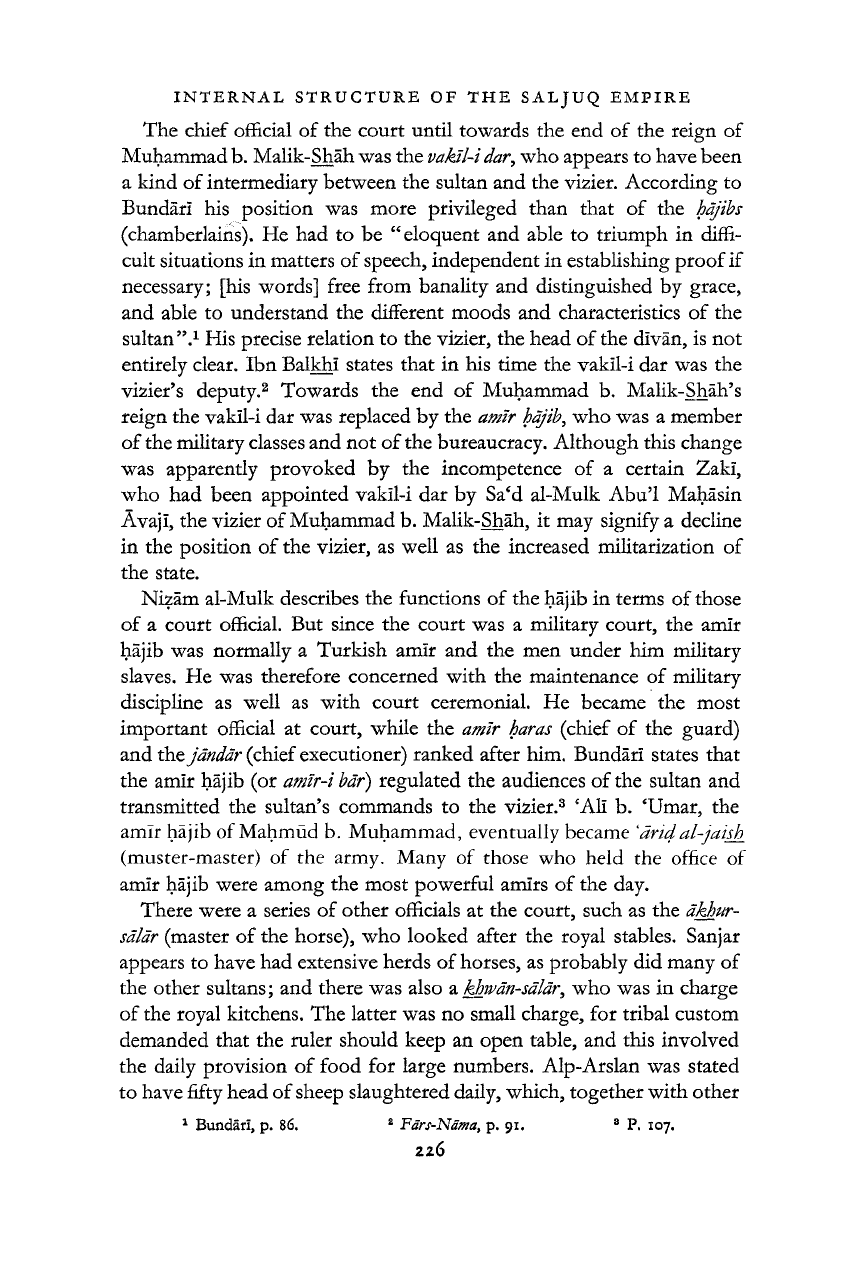
INTERNAL
STRUCTURE
OF THE
SALJUQ
EMPIRE
The
chief
official of the court until towards the end of the reign of
Muhammad b. Malik-
Shah was the
vakJl-i
dar,
who appears to have
been
a kind of intermediary
between
the sultan and the vizier. According to
Bundari his
position
was more privileged than that of the
hdjibs
(chamberlains). He had to be "eloquent and able to triumph in diffi-
cult situations in matters of
speech,
independent in
establishing
proof if
necessary; [his words] free from banality and
distinguished
by grace,
and able to understand the different
moods
and characteristics of the
sultan".
1
His precise relation to the vizier, the head of the divan, is not
entirely clear. Ibn Balkhi states that in his time the vakil-i dar was the
vizier's deputy.
2
Towards the end of Muhammad b. Malik-Shah's
reign the vakil-i dar was replaced by the
amir
hajib,
who was a member
of the military
classes
and not of the bureaucracy. Although this
change
was apparently provoked by the
incompetence
of a certain Zaki,
who had
been
appointed vakil-i dar by Sa'd al-Mulk Abu'l Mahasin
Avaji,
the vizier of Muhammad b. Malik-Shah, it may
signify
a
decline
in the
position
of the vizier, as well as the increased militarization of
the state.
Nizam
al-Mulk describes the functions of the ha
jib
in terms of
those
of a court official. But
since
the court was a military court, the amir
hajib was normally a Turkish amir and the men under him military
slaves. He was therefore concerned with the maintenance of military
discipline
as well as with court ceremonial. He
became
the
most
important official at court, while the
amir
haras
(chief
of the guard)
and the
jdnddr
(chief
executioner) ranked after him. Bundari states that
the amir hajib (or
amir4
bar)
regulated the
audiences
of the sultan and
transmitted the sultan's
commands
to the vizier.
3
'Ali b. 'Umar, the
amir hajib of Mahmud b. Muhammad, eventually
became
'aridal-jaish
(muster-master) of the army. Many of
those
who
held
the office of
amir hajib were
among
the
most
powerful amirs of the day.
There were a series of other officials at the court,
such
as the
dkhur-
sdldr
(master of the horse), who
looked
after the royal stables.
Sanjar
appears to have had
extensive
herds of horses, as probably did many of
the other sultans; and there was
also
a
khwdn-sdldr,
who was in charge
of the royal kitchens. The latter was no small charge, for tribal
custom
demanded
that the
ruler
should
keep
an
open
table, and this involved
the daily provision of
food
for large numbers. Alp-Arslan was stated
to have fifty head of
sheep
slaughtered daily, which, together with other
1
Bundari, p. 86.
2
Fdrs-Ndma,
p. 91.
8
P. 107.
226
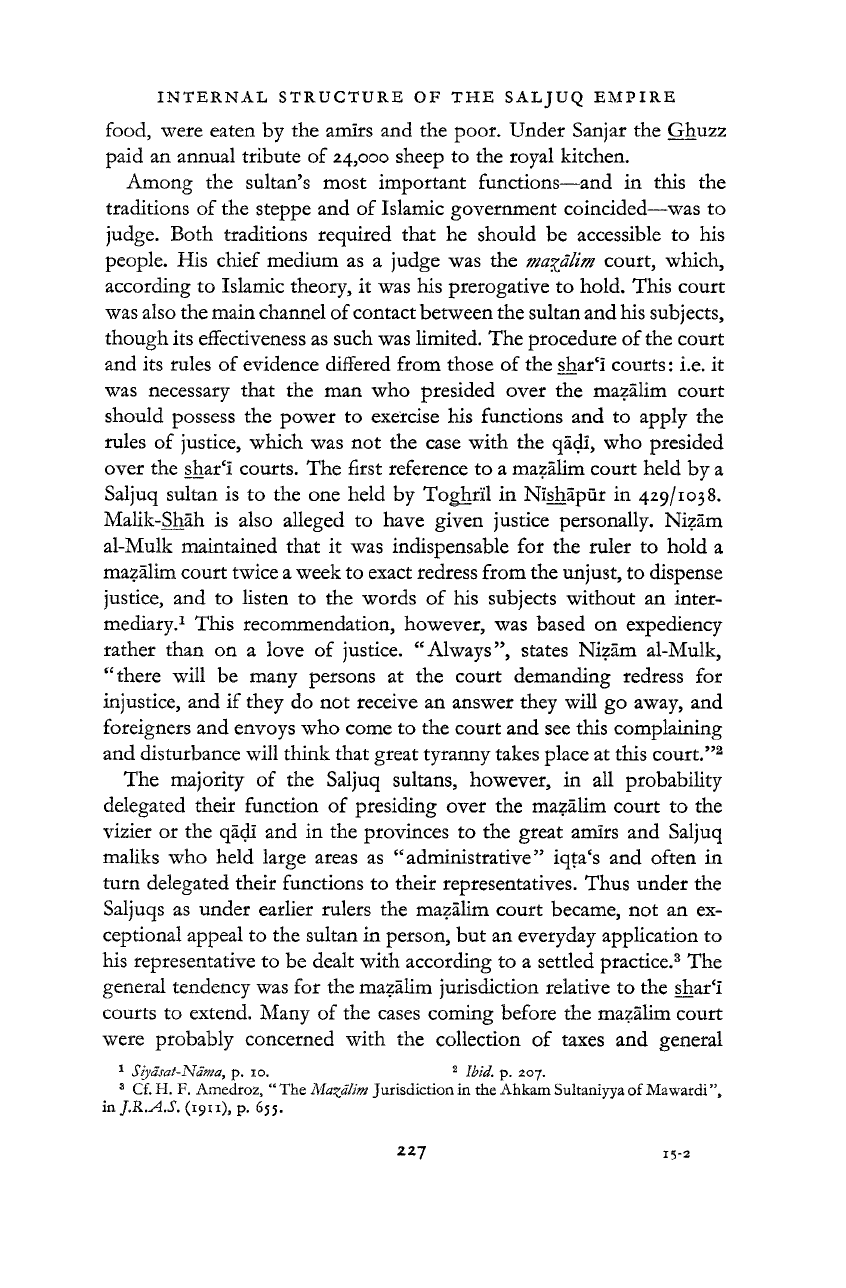
INTERNAL
STRUCTURE
OF THE
SALJUQ
EMPIRE
227
15-2
food, were eaten by the amirs and the poor. Under
Sanjar
the Ghuzz
paid an annual tribute of
24,000
sheep to the
royal
kitchen.
Among the sultan's most important functions—and in this the
traditions
of the steppe and of Islamic government coincided—was to
judge.
Both traditions required that he should be accessible to his
people. His chief medium as a judge was the
mazalim
court, which,
according to Islamic theory, it was his prerogative to hold. This court
was also the main channel of contact between the sultan and his subjects,
though its effectiveness as
such
was limited. The procedure of the court
and its rules of evidence differed from those of the shar'l courts: i.e. it
was necessary that the man who presided over the mazalim court
should
possess
the power to exercise his functions and to apply the
rules
of justice, which was not the case with the qadi, who presided
over
the shar'I courts. The
first
reference to a mazalim court held by a
Saljuq
sultan is to the one held by Toghril in Nishapur in 429/1038.
Malik-Shah
is also alleged to have given justice personally.
Nizam
al-Mulk
maintained that it was indispensable for the
ruler
to hold a
mazalim court twice a week to exact redress from the unjust, to dispense
justice, and to listen to the words of his subjects without an inter-
mediary.
1
This recommendation, however, was based on expediency
rather
than on a love of justice. "Always", states
Nizam
al-Mulk,
"there
will be many persons at the court demanding redress for
injustice, and if they do not receive an answer they will go away, and
foreigners
and envoys who come to the court and see this complaining
and disturbance will think that great tyranny takes place at this court."
2
The majority of the Saljuq sultans, however, in all probability
delegated their function of presiding over the mazalim court to the
vizier
or the qadi and in the provinces to the great amirs and Saljuq
maliks who held large areas as " administrative" iqta's and often in
turn
delegated their functions to their representatives. Thus under the
Saljuqs
as under earlier
rulers
the mazalim court became, not an ex-
ceptional appeal to the sultan in person, but an everyday application to
his representative to be dealt with according to a settled practice.
3
The
general tendency was for the mazalim jurisdiction relative to the shar'l
courts
to extend. Many of the
cases
coming
before the mazalim court
were
probably concerned with the collection of taxes and general
1
Siyasat-Nama,
p. 10.
2
Ibid.
p. 207.
3
C£
H.
F. Amedroz,
"
The
Mazalim
Jurisdiction in the
Ahkam
Sultaniyya
of
Mawardi",
in
J.R.A.S.
(1911),
p. 655.

INTERNAL
STRUCTURE OF THE SALJUQ EMPIRE
228
litigation. It also dealt with
cases
against government officials. Its
decisions
were carried out by the shahna and his officials, or by the
military.
Another
of the sultan's important functions was to defend his
country
and his people in war. In this, too, the tradition of the steppe
and of Islamic government coincided. The first three sultans led the
army
in person.
After
the death of Malik-Shah, with the
accession
of
young boys to the throne, this was not always the case. As a result the
ties between the sultan and the army were weakened, and the soldiers
tended more and more to give their loyalty to their immediate com-
manders
rather
than to the sultan. Desertions in the later period became
relatively
frequent. Moreover the jealousies and quarrels of the amirs
detracted from the efficiency of the army as a fighting force. The core
of the standing army was formed by mamluks and freedmen. On
campaigns they were joined by contingents furnished by the amirs and
by tribal auxiliaries. The armies of the amirs were also in many
cases
composed
round a nucleus of slave troops. The mamluks and freedmen
of the amirs and others, if they did not pass on the death of their
masters to their heirs, were sometimes incorporated into the royal
'askar,
forming a division known by the name of their late master.
Throughout the Saljuq empire there were also bodies of unemployed
soldiery, who were ready to join the standard of any leader in the hope
of plunder. Their existence facilitated the assembling of an army at
short
notice, but it also made easy the rebellion of discontented maliks
and amirs.
For
the most
part
the mamluks of the standing army were Turks who
had
been
captured or bought on the eastern frontiers of the Islamic
world.
A number of Georgians, Greeks, and Armenians, who had
been
captured on the western frontiers—or, like
some
of the Turks,
were
the children of
such
captives—were also enrolled in the standing
army.
Many of the mamluks were carefully trained to fulfil their
various
functions, which were administrative as well as military.
1
The most important group in the army after the Turks, however, were
the Dailamites, who were chiefly infantry, whereas the Turks were
cavalry.
Nizam
al-Mulk advocated that the army should be "mixed",
half
Turkish and half Dailamite. In practice, although the army was
composed
of different elements, the Turkish greatly predominated.
1
Nizam al-Mulk
states
that
the
system
of
training
that
had
prevailed
under
the
Samanids
had
fallen
into
disuse
by his day (Siydsat-Ndma, p. 94).
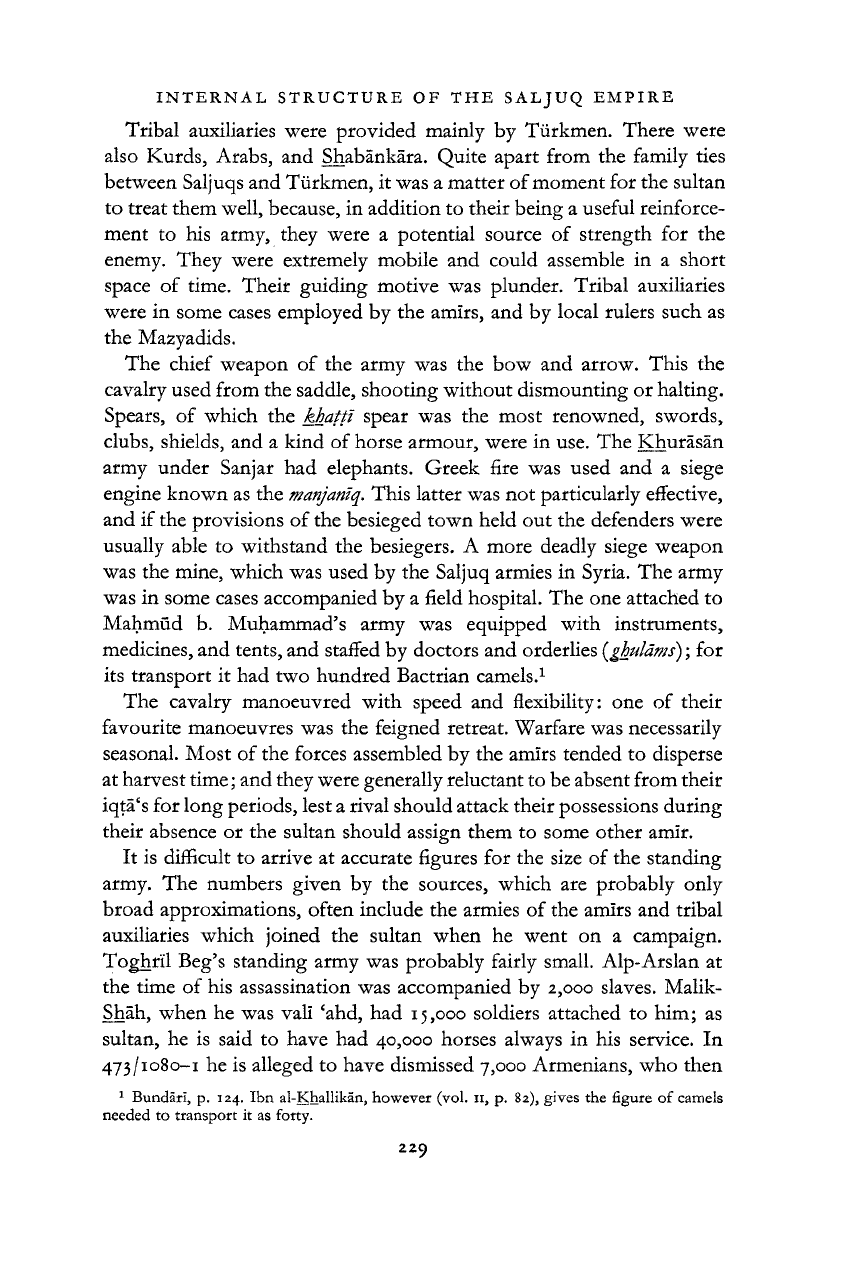
INTERNAL
STRUCTURE
OF THE
SALJUQ
EMPIRE
229
Tribal
auxiliaries were provided mainly by Turkmen. There were
also
Kurds,
Arabs,
and Shabankara. Quite
apart
from the family ties
between Saljuqs and Turkmen, it was a matter of moment for the sultan
to
treat
them well, because, in addition to their
being
a useful reinforce-
ment to his army, they were a potential source of strength for the
enemy. They were extremely mobile and could assemble in a short
space of time. Their guiding motive was plunder. Tribal auxiliaries
were
in
some
cases
employed by the amirs, and by local
rulers
such
as
the Mazyadids.
The chief weapon of the army was the bow and
arrow.
This the
cavalry
used from the saddle, shooting without dismounting or halting.
Spears,
of which the khatti spear was the most renowned, swords,
clubs, shields, and a kind of horse armour, were in use. The Khurasan
army
under
Sanjar
had elephants. Greek
fire
was used and a
siege
engine known as the
manjaniq.
This latter was not particularly effective,
and if the provisions of the
besieged
town held out the defenders were
usually able to withstand the besiegers. A more deadly
siege
weapon
was the mine, which was used by the Saljuq armies in
Syria.
The army
was in
some
cases
accompanied by a field hospital. The one attached to
Mahmud b. Muhammad's army was equipped with instruments,
medicines, and tents, and staffed by doctors and orderlies
(ghulams);
for
its transport it had two hundred Bactrian camels.
1
The cavalry manoeuvred with
speed
and flexibility: one of their
favourite
manoeuvres was the feigned
retreat.
Warfare
was necessarily
seasonal. Most of the forces assembled by the amirs tended to disperse
at
harvest time; and they were generally reluctant to be absent from their
iqta's for long periods, lest a
rival
should attack their
possessions
during
their
absence or the sultan should
assign
them to
some
other amir.
It
is difficult to
arrive
at accurate figures for the
size
of the standing
army.
The numbers given by the sources, which are probably only
broad
approximations, often include the armies of the amirs and
tribal
auxiliaries
which joined the sultan when he went on a campaign.
Toghril
Beg's
standing army was probably
fairly
small. Alp-Arslan at
the time of his assassination was accompanied by
2,000 slaves. Malik-
Shah,
when he was vali
c
ahd, had
15,000
soldiers attached to him; as
sultan,
he is said to have had 40,000 horses always in his service. In
473/1080-1
he is alleged to have dismissed 7,000 Armenians, who then
1
Bundari, p. 124. Ibn al-Khallikan, however (vol. n, p. 82), gives the figure of camels
needed to transport it as forty.
